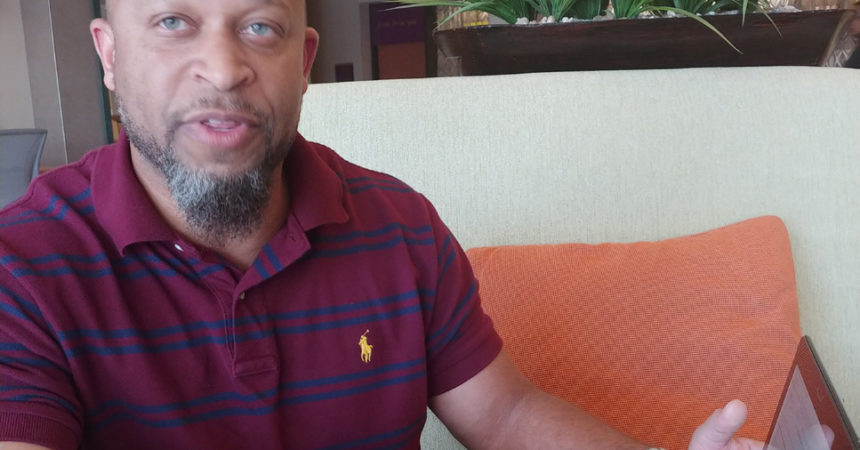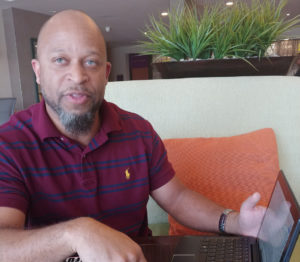
Summertime program grooming future leaders in many ways
Teen leaders

By St. Clair Murraine
Outlook staff writer
During the last two summers, Eljin Rhymes didn’t have a typical vacation like most teenagers do.
No beach trips or a lot of parties. His time was spent working for a paycheck.
And learning valuable life skills.
“It helped my confidence tremendously because I can open myself up when I’m speaking to a crowd of people,” said Rhymes, a senior at Maclay School. “It was worth it because I follow the philosophy to work hard now and relax later. I figure that now I might as well work as hard as I can so that when I get older I will have more time to relax.”
Rhymes was one of 240 teenagers who participated in the city government’s Tallahassee Future Leaders Academy, a multi-faucet-program that connects young people to jobs and helps them develop other life skills. The roots of the program are based in an initiative by former Mayor Andrew Gillum in an attempt to improve the quality of life for young people living in communities that struggle with poverty and high crime rates.
Willie Williams, who works in the city’s human resources office with a focus on developing talent, has been in-charge of the program for the past three years. He and other organizers have brought on several initiatives that have changed it from being just a summer job-opportunity program when it started with 30 teenagers.
Last summer 240 teenagers participants worked in the private and non-profit sectors. At the same time, they participated in workshops that taught them fiscal responsibility, while they were also exposed to college tours.
The program has five foundational principles – job readiness training, employment, college exposure, financial literacy, education community involvement.
The first two weeks of the eight-week program are spent on developing job-readiness skills. His goal is to add something to the program that will enhance the value for participants, Williams said.
He and other organizers of the program have been able to convince business owners to provide some of the jobs. Additionally TCC allows the teenagers to earn a certificate that improves their ability to get jobs after they have aged out of the program. FAMU and FSU have also come on to provide other assistance to the students in ways that prepare them for life after high school.
“My mind frame is always; how do we expose them to more in such a short timeframe,” he said. “What all can we give them to make this a comprehensive program so when they leave here they are better and they know how to matriculate the rest of the steps without us. I work with a great team in human resources to pull this off.”
For good reason. Williams is pushing to increase the number of teenagers ages 15-19 who could participate in the program. He pointed to the fact that Leon County has a youth population of 25,000.
Additionally, Williams said, 65 percent of teenagers in the program live in single-parents households, while 60 percent of them live in households with asset limited income, which is based on a report by United Way.
In many cases, teenagers in the program make about $920 for six weeks of work. That Williams said, telling the story of a student whose involvement became a necessity.
“I have to give my check to my mom because we’ve got to have this or we’ve got to have that,” Williams said the teenager told him.
In another case, Williams said a parent expressed her gratitude for her child being in the program. The family fell on hard times when she was unable to work due to a surgery, but they managed on the salary that the young man made.
He was able to make $3 more than others who worked in the department where he worked at Wal-Mart. That, Williams said, was because he earned a certificate, one of the benefits of the program.
“Isn’t it amazing $3 more could keep a household running,” Williams said. “That is because of the transferable skills. When you’re talking about poverty; you’re talking about households that are able to sustain.
“We are well aware that with a lot of the youths the check they make is going to toward the household during the summer time. That’s how you impact the poverty.”
Williams said he was also surprised to find out that although some of the participants come from a home where at least one parent has a college degree, many of the teenagers hadn’t been on the campuses of FSU, FAMU or TCC before being in the program.
“One of the things that we realized was that the lack of exposure is what held a lot of them back,” he said. “Not all of our students are privy enough to have the same exposure; not everything is created equal. They are disproportioned and inequalities exist.”
The program has won three major honors for the city last year, including the National League of Cities’ Cultural Diversity Award, the International City/County Management Association’s Community Partnership Program Excellence Award, and the City Livability Award from the United States Conference of Mayors along with an Outstanding Achievement Award.
Myesha Easter, who aged out of the program last summer, said it was an experience that she wouldn’t have traded.
“It was more than I expected,” said Easter, who is a freshman at the University of Florida.
Her job in the program was in a position with the city.
“They made me felt like I belonged there,” she said. “They gave me different assignments that I had to work on and I had to attend staff meetings every week.”
She uses every opportunity she can to recruit other students for the program. Like her, she said, new participants will find the program invaluable.
“I would most definitely encourage them to participate in this program or at least apply for it,” said Easter, a Godby High School graduate. “There are things that I have learned that weren’t part of the high school curriculum.
“I definitely encourage young people because the people who coordinate it work very hard to put together this program to give students the opportunity to look on the inside of a professional field.”







